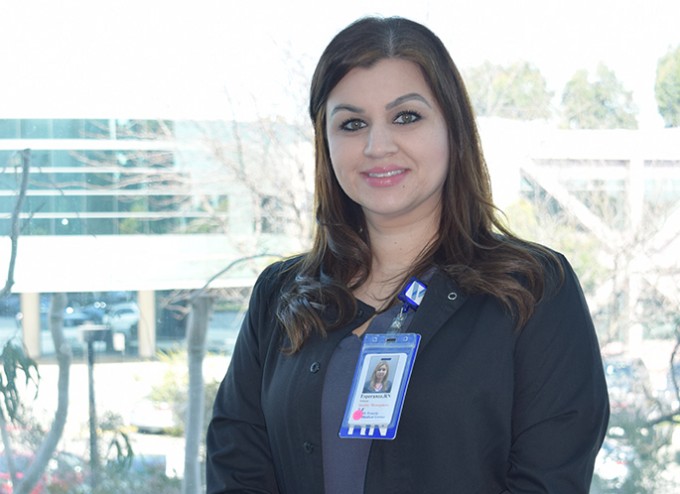My Specialty
Infection Prevention Nursing, Esperanza Salazar, St. Francis Medical Center
Combating outbreaks and hospital-associated infections

Esperanza Salazar, BSN, RN, CIC, HACP
Manager, Infection Prevention
St. Francis Medical Center, Lynwood
How is your team responding to the present COVID-19 outbreak?
My responsibilities change drastically during an outbreak or pandemic like the current COVID-19 crisis. My primary role during an outbreak shifts to hospital preparedness and response to potential cases. I’m on call 24/7.
The most challenging aspect is the ever-changing guidelines from the CDC and other agencies. While those guidelines are necessary to ensure the safety of our healthcare workers, they can create obstacles for leaders and are often stressful for the entire healthcare team. Furthermore, we must often tackle protocols that change overnight, sometimes multiple times a day. This involves reeducating and disseminating information to more than 2,500 employees in a very short period of time.
As an example, our facility organized in-services for staff regarding the level of personal protective equipment (PPE) required to care for suspected or confirmed COVID-19 cases. As soon as our staff were able to complete the education, we had to inform them about the updated guidelines. It can be hard for staff to accept such changes because reverting to a lower level of protection can leave people feeling unprotected. My team’s credibility as infection preventionists may even be questioned.
How did you become interested in this nursing specialty?
I can honestly say that I was thrown into the infection control specialty (now called infection prevention) about 15 years ago. It all began with sorting labs and assisting the directors of infection control for two different hospitals on days when I was flexed as an LVN. As I continued to work with the IC directors, I developed increased interest in the field of infection prevention. I simply found bacteria, viruses and diseases fascinating.
After a few months, I began to search for courses in infection control in order to take a deeper dive into the field. Additionally, I had the privilege of shadowing my father, as he was heavily involved in the facilities’ disaster planning. At that time, H1N1 was a hot topic, and he was able to guide me through emerging disease trainings.
What’s something you learned that was surprising or unexpected?
At first, I thought infection prevention guidelines were geared only for nursing; boy, was I wrong! It was fascinating to also learn what roles dietary, engineering/facilities and environmental services play in reducing and preventing infections. As a novice infection preventionist (IP), I had to take a crash course in engineering controls, cleaning and disinfection practices, and accreditation and standards interpretation, as well as the ever-evolving infection definitions. It was definitely overwhelming.
As an infection prevention nurse, what are your general responsibilities?
Where do I begin? In general, my main responsibility is to minimize morbidity and mortality associated with healthcare-associated infections (HAIs) by identifying, monitoring, controlling and preventing the occurrence of infectious diseases within all areas of the healthcare setting and the communities we serve.












